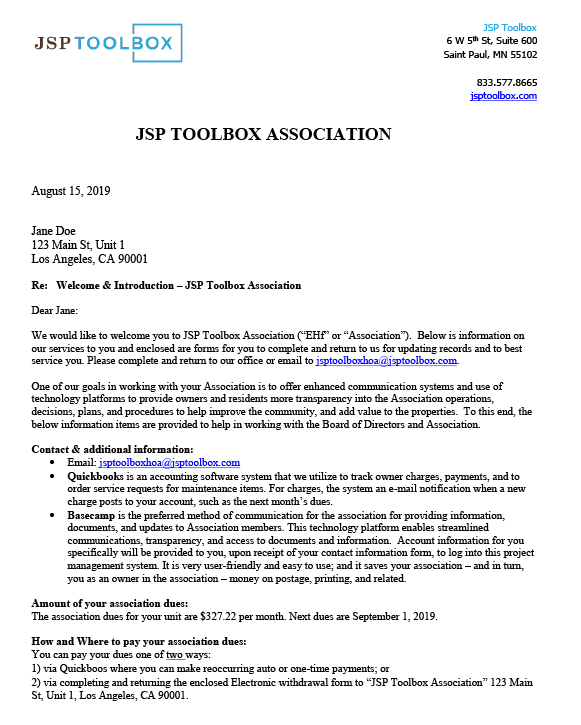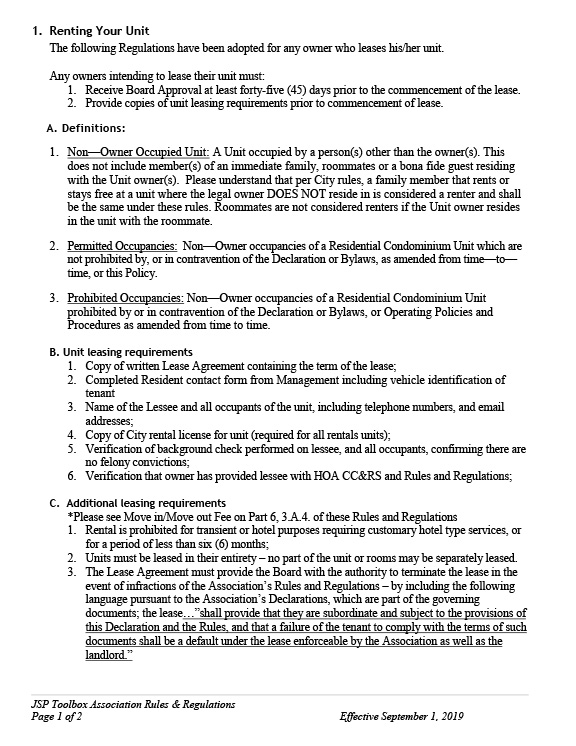Major Life Events come with Solid HOA Practices
Being part of an HOA requires buying or renting a property that is part of an HOA while selling a property is the most common departure from HOA membership. These are major events in most instances and ones where HOAs must have sound systems and policies in place. Renting now can include traditional longer-term leases (12 months or more) and short-term durations. The latter area has exploded and has changed the way local municipalities license, regulate, and tax short rentals, which has impacted HOAs.
HOAs are best served to have clear policies and procedures in place to cover these areas, which are commonly found in the Rules and Regulations.
Buying
Buying is the easiest aspect but knowing what you are getting may be the most challenging. Owners in HOAs understand how HOAs operate; prospective buyers may not. Buying into an HOA property requires you to understand and accept that another governing body has great influence over what you can and cannot do with your property. This cannot be overlooked nor understated.
Most Common Buyer Mistakes and How HOAs can Help
| Buyer does not know home is part of an HOA |
| Ensure the seller, the seller’s real estate professional, and the title company knows the property is part of an HOA. Believe it or not, there are sales that occur privately where a buyer has no clue that the property is part of an HOA–and with that the potential unpaid assessments and related that go with the property. |
| Buyer is unclear what can be done with the property |
| The HOA should have an affirmative signature block document that buyers sign to acknowledge they’ve received the CC&R’s and Rules of Regulations. For further safeguarding, a welcome packet–an example found in Exhibit 7.1 –- should be sent to new owners reminding them of these. Further, additional sample documents can be downloaded and altered to fit your association in the member’s section of JPS Toolbox under ‘HOA Forms & Templates’. |
| Buyer’s representative does not assist the buyer |
| HOAs may face this without intention by the buyers. The best method to overcome this is to remind sellers to make sure buyers receive and review documents carefully, to articulate clearly in disclosures of HOA, and other important items to consider. |
Selling
Use a central location to store documents needed during a sale. Owners’ real estate professionals may require CC&Rs and related documents, including forms to be completed by the HOA as part of the seller disclosure process to the buyer(s). While some forms may require updating on a time-sensitive standpoint, many documents may not. These can easily be stored electronically in an online system to provide to sellers when needed.
Documents may need to be completed by HOA on a time-sensitive basis. The HOA may charge the seller a fee to offset the cost of this. Check your CC&Rs for details about fees.
Common HOA Documents for Sellers and Buyers
Document |
Not Changeable and Accessible to Download |
Time Sensitive and Prepared by the HOA |
| CC&Rs | Yes | No |
|
Architectural control guidelines |
Yes | No |
|
Rules and Regulations |
Yes | No |
|
Current insurance documents for HOA policy |
Yes | Not generally. But a buyer may request insurance include mortgage company for a specific unit. See Certificate of Insurance. |
|
Current Annual Budget |
Yes |
Not generally. But maybe revised by Board during the year. |
|
Resale Disclosure Certificate |
No | Yes |
|
Certificate of Insurance |
Yes | Yes. A buyer may request insurance include mortgage company for a specific unit. |
|
Dues Current Letter |
No | Yes |
|
Association Questionnaire |
No | Yes |
|
Appraisal Request |
Yes. Basic HOA property items can be unchanged. | Yes. Often, appraisals request specific HOA unit items. |
Best practice: Establish a simple protocol that permits owners to request documents from the HOA. This can be as simple as a message posted on the secure system or an email to the HOA dedicated email address. If the HOA plans to charge for documents, be upfront and let the seller know the pricing and payment terms to timely complete the requests.
Best practice: Make sure sellers understand that many documents that need to be completed by the HOA (and for which the seller may be paying costs for) are generally time-sensitive for a period of 30 days. So, it is best to recommend sellers order and pay for these documents from the HOA only when needed.
Use caution in completing documents that a potential buyer may review and base a decision upon. Disclosing what the HOA knows or reasonably believes to occur and avoiding conjecture or unfounded thoughts. These could impact a buying decision and weigh against a seller or owner of the HOA, and ultimately impact the HOA completing the documents.
Renting
One of the most confusing and frustrating aspects of HOAs involves renting. To some, renting is not desired for perceived lack of care, attention, and decreasing value of properties. To others, it is invaluable to protect against a need to move suddenly, to offset costs with income, and to provide options to owners to live life.
Most Common Mistakes HOAs Make About Rentals
| The HOA Can Limit the Number of Rentals through the Rules and Regulations |
|
This is true if the CC&Rs provide that the Rules and Regulates can limit this and do not otherwise provide. Most commonly, this is not the case. Case Example: an HOA of 20 units cannot limit the number of rental units to 3 through the Rules and Regulations if the CC&Rs have not imposed a limit. |
| Rentals Increase the Risk of Past Due Assessments |
| Quite the opposite is generally true. Landlords or owners renting their unit typically comply and pay assessments timely to avoid disruptions and attention to their unit. |
| Rentals Decrease Property Value |
| This can be a localized factor, but the option to rent a property–whether in or out of an HOA–is a value to that property. In some markets, renting a property in the HOA is more valuable than owning. |
| Tenants Don’t Care about the HOA Property |
| Generally, this is not the case. Tenants pay rent commensurate with the quality of a property and HOA properties are generally well attended to. These drives rent prices to points that tenants do value their homes. |
HOAs can reasonably set forth Rules and Regulations to apply to rentals–an example can be found in Exhibit 7.2. Additional verbiage for short term rentals is found in Exhibit 7.3. Most CC&Rs limit the length of rental periods to terms at or over 30 days. Some HOAs in seasonal locations may have permissible short-term rental periods.
Cautionary Note: HOAs cannot entirely prohibit rentals, except in qualified age 55+ communities. Federal guidelines require some permissible exceptions to an HOA policy to prohibit rentals. It is best to verify these before enacting a no-rental policy for your HOA. A downloadable document for these links can be found in the Member section of JSP Toolbox under ‘HOA Forms & Templates’.
It often works best for HOAs to adopt a reasonable rental policy that is:
-
- Consistent with CC&Rs
- Practical to enforce without undue burden on the HOA or Board
- Compliant with Federal, state and local laws–always check before enacting
- Written with specific details and requirements to avoid confusion
HOAs can sometimes rely on local municipalities to carry the heavy load of enforcement. Many cities require rental licensing and some tax payments for rental of HOA units. HOAs can reasonably require licensing by these groups as part of their rental policy.
When it comes to buying, selling, or renting in HOAs, the two most important aspects to effectively handle these items are being clear on what is required and being responsive. Many times, these events involve third parties and are time-sensitive. While it is reasonable for the HOA to take a few days to respond to a question or item falling under these areas, it is equally unreasonable to not have a process in place to provide a response when one is needed.
The best policy around these areas is clarity. While different avenues will have differing interests, the common theme and need is accessibility and timeliness.
-
- Buyers may have questions for the HOA, and a best practice is having a buyer send an email to the dedicated HOA email address.
- Renting owners or landlords typically have deadlines to make decisions, so being responsive and providing clear rental rules is a good idea.
HOA Best Practices for Transacting Owners
| Sellers |
| There is usually a need for documents under a certain time limitation often set by state laws for HOA transactions. A best practice is to have a written policy to let owners know where and how to get the needed documents for a sale. |
| Buyers |
| Many times, potential buyers have a question for the HOA that impacts their decisions on an offer. A best practice is having a buyer email the HOA at the dedicated HOA email address so a proper response can be made, timely and clearly. |
| Renting Owners or Landlords |
| This category of owner often asks forgiveness rather than permission. They tend to act on a basis of assumption first, and then confirm with their HOA after their unit has been rented. A best practice is to have clear written Rules and Regulations detailing items and information needed to comply with HOA requirements. Exhibit 7.2 illustrates a sample of the reasonable renting requirements set forth by an HOA. |
Exhibits
| Exhibit 7.1 – Sample HOA Welcome Packet | Exhibit 7.2 – Sample Rental R&R |
 |
 |